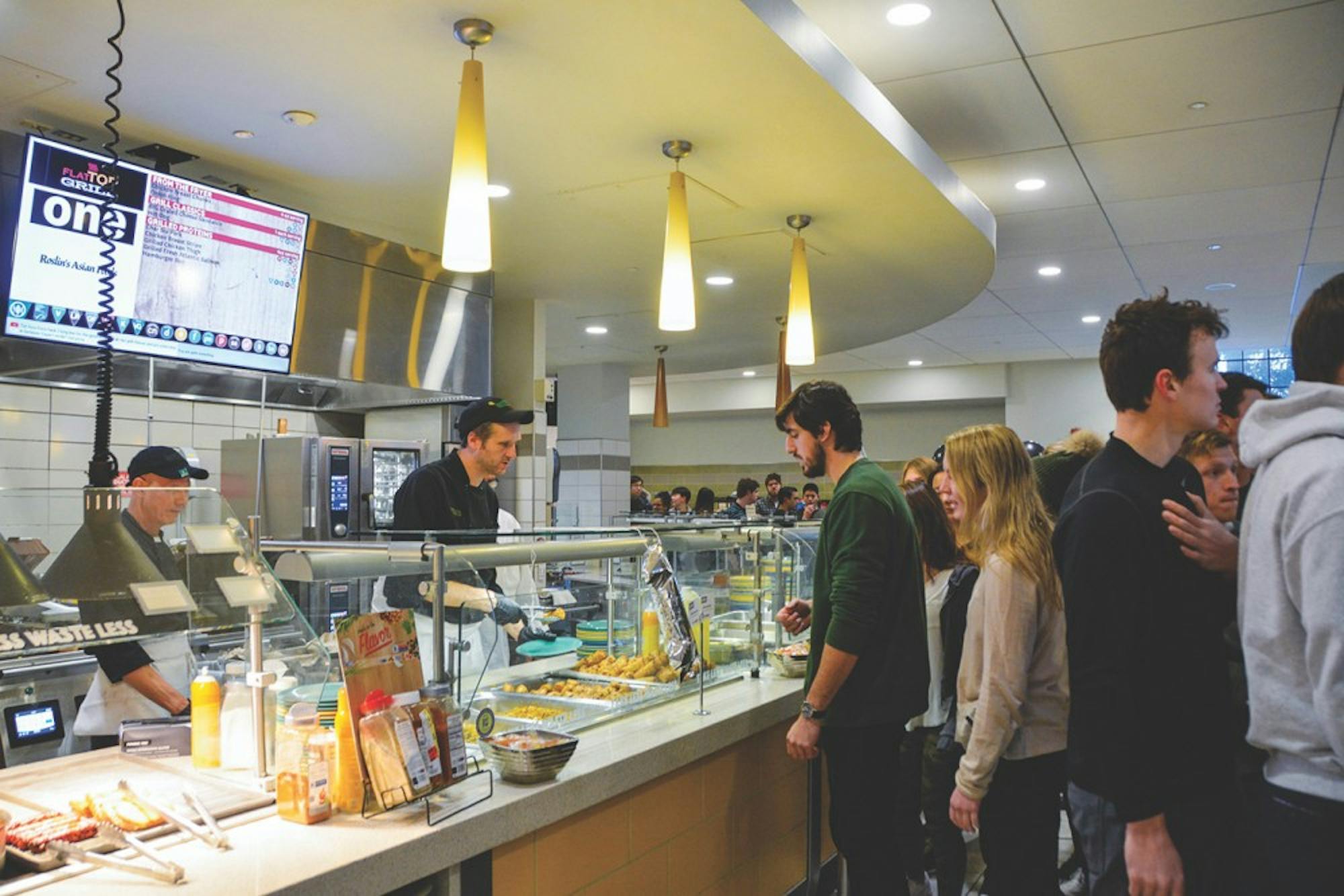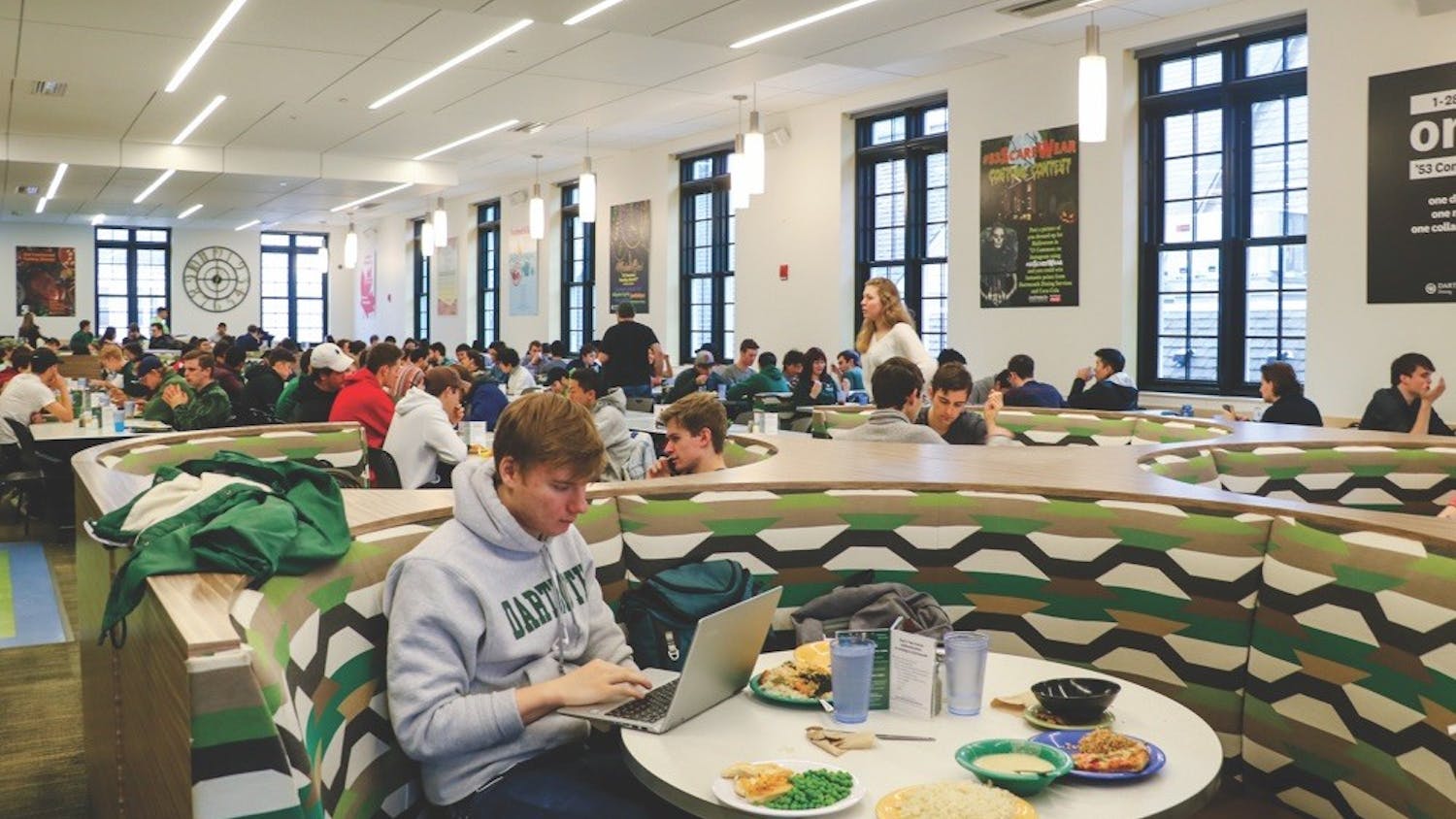As we look forward to the 2019-2020 school year, new changes — from new meal plans to a new feature of the GET Funds app that would allow students to place food orders ahead of time — will affect students’ interactions with food on campus.
Dartmouth Dining Services oversees student meal plans as well as day-to-day offerings at each dining facility on campus. There are currently four DDS-operated dining locations where students can get meals throughout the day: the Class of ’53 Commons, colloquially known as Foco; Collis Café; The Courtyard Café, called “the Hop” due to its location in the Hopkins Center for the Arts; and the Novack Café. Additionally, there are three student-operated, residential snack bars on campus, located in Brace Commons, Goldstein Hall and House Center B by the Allen House and School House dormitories.
Students have a wide spectrum of opinions on DDS and the services it provides, and, according to DDS director Jon Plodzik, DDS implements changes in response to students’ ideas.
One of the biggest changes to dining is a new feature on the GET Funds app, an app which currently allows students to track their dining balance, among other features. According to Plodzik, students will be able to place orders for food ahead of time at the Hop beginning in October. Plodzik said the change comes in response to student feedback regarding long lines and wait times at the Café. He also said that he hopes that the service will be expanded to other dining facilities in the near future, depending on how well the pilot program at the Hop runs.
The next few years will also bring the expansion of Dartmouth’s dining facilities. According to Plodzik, a new dining facility in the Dana Medical Library — which is still under construction — is slated to open in the winter of 2020 and will offer a range of new food options for students. That café will offer a variety of beverages and snacks — most notably, products from Starbucks, which students will be able to purchase using dining dollars, commonly called “DBA.”
With the construction of the new computer science building and Irving Institute for Energy and Society on the west end of campus, Plodzik said he hopes DDS will be able to open additional locations in the upcoming years.

Madison Wilson / The Dartmouth Staff
Additionally, the 2019-20 school year will mark a shift in the range of meal plans available to students. Meal plan options for the upcoming academic year have been reduced to the Ivy Standard Unlimited, the 115 Block+, the 80 Block+ and the 5 Meals Weekly — a reduction from the variety of weekly meal plans offered in previous years.
An extension to the Ivy Standard plan introduced last year, the Ivy Standard Unlimited plan will grant students continuous access to Foco throughout the day, from 7:30 a.m. to 8:30 p.m. Students on the plan will receive three guest passes for family members and friends to access Foco, in addition to $250 in dining dollars for the term, according to Plodzik.
Plodzik noted that the Ivy Standard Unlimited plan will hopefully create a “culture shift” within Dartmouth’s dining facilities, transforming Foco into an all-day study area where students can come and go as they please.
Freshmen will automatically be enrolled in the Ivy Standard Unlimited plan for their first term at the College, after which they can elect to switch into a different meal plan. While it is common for students to opt out of the default meal plan after their freshman fall, Caroline Atwood ’21 remained on the Ivy Standard plan throughout her sophomore year.
“It’s nice not having to worry about whether or not I’ll have enough DBA for each meal,” Atwood said. “I’d say it’s a good plan for people who keep a regimented eating schedule, or for athletes who need to eat a lot throughout the day.”
However, Atwood noted that in light of the new Ivy Standard Unlimited plan, which costs $80 more per term than her previous plan, she is considering other, less expensive options.
Lidia Balanovich ’22 echoed concerns about the affordability of dining options at the College. In particular, she expressed frustration with the lack of variety in meal plan offerings, as well as the fact that all students are required to pay for a meal plan.
“Just think about how much money someone could save if they were just allowed to cook for themselves and not be forced on a meal plan, or if they could have a cheap meal plan option without having to live off campus,” Balanovich said.
She added that the high prices of à la carte items across DDS’s locations exacerbate these financial issues.
“My student loans are going to be paying for my $5.95 kombucha for like 10 years,” she joked. “I do think that marking up prices is honestly and unfortunately normal across all colleges in the United States, but how Dartmouth does it is just too much.”
Each dining facility offers its own staple dishes and styles of service. As an all-you-can-eat buffet-style eatery, Foco boasts an array of stations serving comfort foods, vegan and vegetarian cuisine, kosher options, desserts and more. Students can get made-to-order sandwiches, stir-fry, sushi and pasta from Collis Café and can head to the Hop for grilled foods such as burgers and quesadillas, as well as a variety of freshly-prepared salads. Located in Baker-Berry Library, Novack Café offers a selection of grab-and-go sandwiches, snacks and drinks. Items at Collis, the Hop and Novack Café can be purchased using dining dollars, while most attending Foco opt to use meal swipes.
At Foco, its gooey chocolate chip cookies are a perennial favorite among students, professors and visitors to the College alike. During the busiest parts of a Dartmouth term, the dining hall dishes out over a thousand of its signature dessert per day, according to ’53 Commons general manager Jennifer Nakhla.
“Those cookies are certainly hard to resist,” Plodzik laughed. “Believe me, I eat here twice a day, every day.”
For Atwood, the Hop holds a special place among the dining options on campus.
“The Hop is definitely my preferred place to eat,” Atwood said. “I like the fact that I can just use a meal swipe and get the special for the day, and it’s always good and it’s always something different.”
Atwood noted that the Hop’s chicken bowl special — a platter with chicken, corn, mashed potatoes and gravy — is her favorite meal served on campus.
However, Seysha Mehta ’21 noted that for vegetarian students like herself, satisfying meals are not always as easy to come by.
“Especially for vegetarian options, the food can feel really repetitive,” Mehta said. “[For example,] all you can really have for Collis stir-fry is tofu and the same limited range of vegetables. It’s kind of tiring.”
Mehta added that the high prices of fruits and vegetables pose a unique dilemma to vegetarian students.
“I feel like we’re disincentivized to eat vegetables and fruit because they’re always so expensive,” she said. “It can be upsetting because you want to eat healthier, but then buying junk food is just way easier.”
According to Plodzik, DDS receives student feedback from the Dining Advisory Group — a session hosted by DDS twice a term, open to students who wish to share their concerns — as well as through an annual survey distributed to the student body. He said that a primary takeaway from the past year’s survey was the need to reduce the lines and waiting times at DDS locations.
Plodzik said that he welcomes students to voice their suggestions and concerns regarding dining at Dartmouth, and they can text DDS using “The Scoop” messaging service. He added that he can frequently be found on the main floor of Foco, where students can approach him with ideas for changes they would like to see within DDS.
“I like to think of myself as the CHO — the Chief Happiness Officer here,” Plodzik said. “I want folks to say they love dining. This should be one of the high points of your day.”
This article is a part of the 2019 Freshman Issue.
Elizabeth Janowski '21 is the news executive editor of the 177th directorate. Hailing from Brookfield, Wisconsin, she is pursuing a double major in history and film and media studies.




